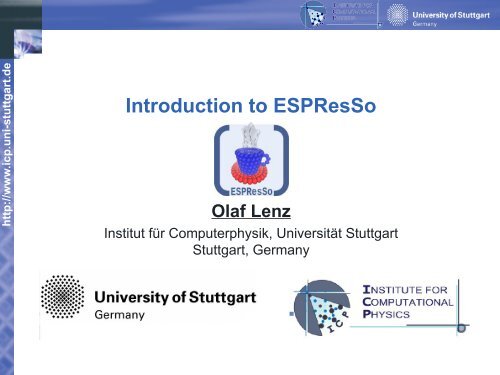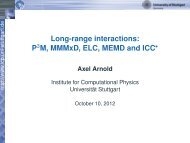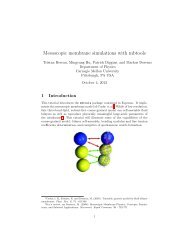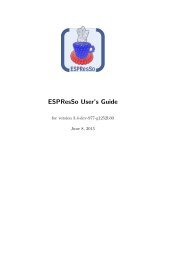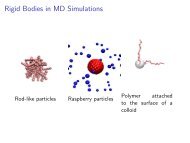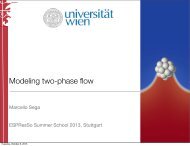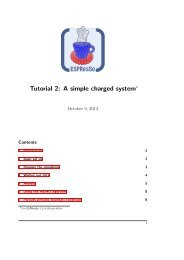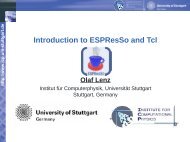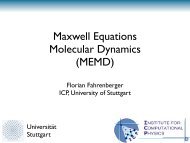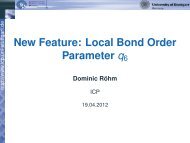Introduction to ESPResSo
Introduction to ESPResSo
Introduction to ESPResSo
You also want an ePaper? Increase the reach of your titles
YUMPU automatically turns print PDFs into web optimized ePapers that Google loves.
http://www.icp.uni-stuttgart.de<br />
<strong>Introduction</strong> <strong>to</strong> <strong>ESPResSo</strong><br />
Olaf Lenz<br />
Institut für Computerphysik, Universität Stuttgart<br />
Stuttgart, Germany
http://www.icp.uni-stuttgart.de<br />
<br />
<br />
Coarse-Graining<br />
All-A<strong>to</strong>m Models<br />
<br />
<br />
Model all a<strong>to</strong>ms and their interactions with semi-quantitative parameters<br />
Only small systems and short times can be simulated<br />
Coarse-Grained Models<br />
<br />
Time scale<br />
Coarse-Graining<br />
All-A<strong>to</strong>m<br />
Quantum<br />
Molecular<br />
Only model “important” degrees of freedom<br />
<br />
Allows for much larger time and length scales<br />
Olaf Lenz<br />
<strong>Introduction</strong><br />
Soft Fluid<br />
Finite<br />
Elements<br />
Length scale<br />
2/29
Why yet another Simulation Package?<br />
http://www.icp.uni-stuttgart.de<br />
<br />
<br />
<br />
<br />
<br />
Coarse-grained Bead-spring models:<br />
Combine several a<strong>to</strong>ms in<strong>to</strong> a single bead<br />
Often combined with other methods<br />
<br />
Special interactions (DPD, Gay-Berne ellipsoids, ...)<br />
<br />
Special integra<strong>to</strong>rs (MCPD, Hybrid MC/MD, ...)<br />
<br />
Combined with lattice models (Lattice-Boltzmann, MEMD, ...)<br />
<br />
<br />
Uncommon simulation pro<strong>to</strong>cols (Simulated annealing, Parallel tempering, …)<br />
Special constraints (Walls, Pores, …)<br />
Standard MD simulation packages (GROMACS, NAMD, AMBER, …)<br />
are not flexible enough <strong>to</strong> deal with these models<br />
Package must be flexible!<br />
In research, new methods are developed<br />
Building new methods in<strong>to</strong> highly optimized code (GROMACS, NAMD,<br />
AMBER, …) is very hard<br />
Package must be extensible!<br />
Olaf Lenz<br />
<strong>Introduction</strong><br />
3/29
Philosophy<br />
http://www.icp.uni-stuttgart.de<br />
<br />
<br />
<br />
<br />
ES is intended as a research <strong>to</strong>ol and a production platform<br />
ES provides the methods for coarse-grained simulations<br />
However, an understanding of the methods is required <strong>to</strong> be able<br />
<strong>to</strong> use <strong>ESPResSo</strong><br />
ES can not check whether what you do makes sense!<br />
Golden Rules<br />
1. <strong>ESPResSo</strong> can not be used as a black box<br />
2. <strong>ESPResSo</strong> does not do the physics for you<br />
Olaf Lenz<br />
<strong>Introduction</strong><br />
4/29
Methods<br />
http://www.icp.uni-stuttgart.de<br />
<br />
<br />
<br />
<br />
<br />
<br />
<br />
<br />
Integra<strong>to</strong>rs and ensembles: Velocity-Verlet algorithm (NVE), Langevin thermostat<br />
(NVT), Barostat by Dünweg (NPT), Generalized Hybrid Monte-Carlo, Quarternion<br />
integra<strong>to</strong>r for non-spherical particles or point-like dipoles, ...<br />
Nonbonded interactions: Lennard-Jones, Gay-Berne, Buckingham,, …<br />
Bonded interactions: harmonic, FENE, tabulated, bond-angle interaction, dihedral<br />
interaction, ...<br />
Long-range interactions: for electrostatics: P³M, MMM1D, MMM2D, Ewald, ELC and<br />
MEMD; for point-like dipoles: dipolar P³M, ScaFaCoS (FMM, ...), ...<br />
Hydrodynamic interactions: DPD, Lattice-Boltzmann fluid (on GPGPU) coupled <strong>to</strong><br />
particle simulation<br />
Constraints: Particles can be fixed in any directions; walls, pores, spheres...<br />
Analysis: energy components, pressure tensor, forces, distribution functions, structure<br />
fac<strong>to</strong>rs, polymer-specific analysis functions (radius of gyration, ...), output <strong>to</strong> VMD<br />
...and it is continuously growing...<br />
Olaf Lenz<br />
<strong>Introduction</strong><br />
5/29
Availability<br />
http://www.icp.uni-stuttgart.de<br />
<br />
<br />
<br />
<br />
Free, open-source<br />
Source code hosted at GNU Savannah<br />
(not a GNU core project, though)<br />
GNU General Public License (GPLv3)<br />
<br />
<br />
Code may be freely downloaded, modified<br />
and redistributed<br />
Provided that the GPL is kept<br />
Portable<br />
<br />
Can be easily compiled and run on all<br />
POSIX platforms (think: Unix) known <strong>to</strong> us<br />
https://savannah.nongnu.org<br />
/projects/espressomd/<br />
<br />
<br />
Windows?<br />
Distribution packages exist for<br />
?<br />
<br />
Gen<strong>to</strong>o Linux (Chris<strong>to</strong>ph Junghans)<br />
<br />
Fedora Linux (Thomas Spura; in progress)<br />
<br />
… anybody interested in packaging for other<br />
distributions?<br />
Olaf Lenz<br />
<strong>Introduction</strong><br />
6/29
Distribution<br />
http://www.icp.uni-stuttgart.de<br />
<br />
<br />
163 Citations of the 2006 article (Web of Knowledge)<br />
Used by ~20 scientific working groups<br />
Citations per year<br />
(from Web of Science, including self-citations)<br />
Olaf Lenz<br />
<strong>Introduction</strong><br />
7/29
http://www.icp.uni-stuttgart.de<br />
Impact<br />
Olaf Lenz<br />
2007<br />
2010<br />
<strong>Introduction</strong><br />
2011<br />
8/29
Code<br />
http://www.icp.uni-stuttgart.de<br />
<br />
<br />
<br />
<br />
From Ohloh<br />
(https://www.ohloh.net/p/<strong>ESPResSo</strong>_MD)<br />
4,946 commits from 59 Contribu<strong>to</strong>rs<br />
~ 123,650 lines of code<br />
Estimate: ~31 person years, ~1.7M$ cost<br />
Olaf Lenz<br />
<strong>Introduction</strong><br />
9/29
Web resources<br />
http://www.icp.uni-stuttgart.de<br />
<br />
Home page<br />
http://espressomd.org<br />
<br />
<br />
<br />
<br />
<br />
<br />
Olaf Lenz<br />
Hosted at ICP<br />
Central resource for users<br />
Downloads<br />
Documentation → next slide<br />
Community and Support<br />
<br />
<br />
<br />
(Link <strong>to</strong>) Bug tracker<br />
(Link <strong>to</strong>) Mailing lists<br />
(Link <strong>to</strong>) Wiki<br />
Developer's Zone (in the wiki)<br />
<br />
<br />
<br />
Developer's docs<br />
(Link <strong>to</strong>) Savannah project<br />
(Link <strong>to</strong>) Source code reposi<strong>to</strong>ry<br />
<br />
<strong>Introduction</strong><br />
Savannah Project Page<br />
https://savannah.nongnu.org/projects/espressomd<br />
/<br />
<br />
<br />
<br />
<br />
<br />
Hosted at GNU Savannah servers<br />
Download area<br />
<br />
Releases and NEWS<br />
Mailing list<br />
espresso-users@nongnu.org<br />
<br />
Only mailings from members are<br />
accepted<br />
Bug tracker<br />
<br />
Report bugs in releases!<br />
Mostly intended for Developers<br />
<br />
<br />
<br />
<br />
<br />
Mailing list<br />
espresso-devel@nongnu.org<br />
News<br />
Source code reposi<strong>to</strong>ry<br />
Task manager<br />
Patch manager<br />
10/29
User Documentation<br />
http://www.icp.uni-stuttgart.de<br />
<br />
<br />
<br />
<br />
User's Guide<br />
<br />
<br />
<br />
<br />
PDF document<br />
In release package<br />
<br />
<br />
Off-line<br />
Matches the release<br />
On web site (from build server)<br />
<br />
<br />
Outline<br />
<br />
<br />
<br />
Up-<strong>to</strong>-date<br />
Contains ToDo-Boxes<br />
<strong>Introduction</strong><br />
First steps: Quick start<br />
Rest: Reference manual<br />
FAQ (on home page)<br />
<br />
<br />
Not very complete<br />
Please contribute!<br />
Mailing list archive<br />
Bug tracker<br />
Olaf Lenz<br />
<strong>Introduction</strong><br />
11/29
Getting Help<br />
http://www.icp.uni-stuttgart.de<br />
<br />
<br />
RTFM!<br />
<br />
<br />
<br />
FAQ<br />
User's Guide<br />
Mailing list archives<br />
Use Mailing List<br />
<br />
<br />
<br />
<br />
Include version, OS, features<br />
Also send replies <strong>to</strong> the list<br />
<br />
<br />
If you send huge files, better provide a link<br />
In a long, detailed discussion you can just<br />
send a summary at the end<br />
Please remember: the developers are not<br />
paid for replying!<br />
Please do not write <strong>to</strong> developers<br />
personally<br />
<br />
<br />
All mailings are archived so others can<br />
benefit<br />
Mailing list reaches everybody<br />
Olaf Lenz<br />
<strong>Introduction</strong><br />
12/29
Requirements<br />
http://www.icp.uni-stuttgart.de<br />
<br />
<br />
<br />
<br />
C-Compiler (GNU CC is best tested)<br />
Bourne shell, GNU make<br />
Tcl<br />
<br />
Including headers / devel package!<br />
Optional<br />
<br />
<br />
<br />
FFTW<br />
<br />
<br />
MPI<br />
<br />
<br />
<br />
<br />
CUDA<br />
<br />
<br />
Including headers<br />
Required for P3M<br />
e.g. OpenMPI, MPICH<br />
Including headers<br />
Required for parallel execution<br />
Useful <strong>to</strong> know how <strong>to</strong> use it<br />
For LB-GPU code<br />
More in the future?<br />
Olaf Lenz<br />
<strong>Introduction</strong><br />
13/29
Compiling<br />
http://www.icp.uni-stuttgart.de<br />
<br />
<br />
Necessary evil<br />
<br />
<br />
Few binary packages exist<br />
For optimal performance,<br />
recompilation is necessary<br />
Typically 3 steps<br />
<br />
Configure code configure<br />
<br />
<br />
<br />
Use --help <strong>to</strong> get options<br />
Use CPPFLAGS and LDFLAGS when<br />
libraries are installed non-standard<br />
Logfile config.log contains<br />
additional information<br />
<br />
Compile code make<br />
<br />
<br />
Installation is usually not<br />
required<br />
Separate source and build dir<br />
<br />
<br />
<br />
<br />
The Source dir is where the source<br />
code resides<br />
The Build dir is where all files<br />
created by the compilation are<br />
created<br />
No file in the Source dir is modified<br />
Call configure from the build dir<br />
cd $builddir;<br />
$srcdir/configure<br />
<br />
Use -j np <strong>to</strong> compile in parallel<br />
<br />
Run testsuite make check<br />
<br />
Use processors=”1 2” <strong>to</strong> specify<br />
the numbers of tasks<br />
Olaf Lenz<br />
<strong>Introduction</strong><br />
14/29
Activating and Deactivating Features<br />
http://www.icp.uni-stuttgart.de<br />
<br />
<br />
<br />
<br />
<br />
<strong>ESPResSo</strong> supports various<br />
different features<br />
Not all features are compiled in<br />
To check, call code_info<br />
Create file myconfig.h in build<br />
or source dir <strong>to</strong> change the<br />
default set of features<br />
Use minimal set of features for<br />
optimal performance<br />
#define PARTIAL_PERIODIC<br />
#define ELECTROSTATICS<br />
#define DIPOLES<br />
#define ROTATION<br />
#define ROTATIONAL_INERTIA<br />
#define MDLC<br />
#define EXTERNAL_FORCES<br />
#define CONSTRAINTS<br />
#define MASS<br />
#define EXCLUSIONS<br />
#define COMFORCE<br />
<br />
The term “features” is probably<br />
not well chosen<br />
#define COMFIXED<br />
#define MOLFORCES<br />
<br />
The code has a lot of features that<br />
do not have a compiler switch<br />
#define MODES<br />
#define BOND_VIRTUAL<br />
<br />
Goal: remove all features<br />
Example myconfig.h<br />
Olaf Lenz<br />
<strong>Introduction</strong><br />
15/29
http://www.icp.uni-stuttgart.de<br />
<br />
<br />
Architecture<br />
Simulation core<br />
<br />
<br />
<br />
Written in ANSI C<br />
MPI parallelized<br />
Optimized<br />
Control layer<br />
<br />
<br />
<br />
<br />
Simulation core is controlled via the<br />
scripting language Tcl<br />
High-level Tcl commands <strong>to</strong> control<br />
the simulation and analyze the<br />
system<br />
A simulation is defined by an<br />
“<strong>ESPResSo</strong> script”<br />
Tcl script is not executed in parallel!<br />
CPU 0<br />
Tcl<br />
<strong>ESPResSo</strong><br />
script<br />
Master<br />
Tcl Interface<br />
C<br />
MPI<br />
Slave<br />
CPU 1<br />
.<br />
.<br />
setmd box_l 10.0 10.0 10.0<br />
integrate 1000<br />
# compute kinetic energy<br />
set e_kin \<br />
[analyze energy kinetic]<br />
.<br />
.<br />
C<br />
MPI<br />
Slave<br />
CPU 2<br />
C<br />
Example <strong>ESPResSo</strong> script<br />
Olaf Lenz<br />
<strong>Introduction</strong><br />
16/29
Writing an <strong>ESPResSo</strong> Script<br />
http://www.icp.uni-stuttgart.de<br />
<br />
<br />
Example files: lj.tcl and<br />
stretched_polymer.tcl<br />
<br />
<br />
lj.tcl: Lennard-Jones fluid<br />
stretched_polymer.tcl:<br />
Stretched polymer<br />
Outline<br />
<br />
<br />
<br />
<br />
Set up the system<br />
Set up the particles<br />
Set up the interactions<br />
Running the simulation<br />
Snapshot of the LJ system<br />
<br />
Warmup integration<br />
<br />
Main integration<br />
<br />
Analysis<br />
<br />
Sections correspond roughly <strong>to</strong><br />
chapters in UG<br />
<br />
Detailed command syntax can be<br />
found in UG<br />
Schema of the stretched polymer<br />
Olaf Lenz<br />
<strong>Introduction</strong><br />
17/29
Setting Up the System: Global Variables<br />
http://www.icp.uni-stuttgart.de<br />
<br />
<br />
<br />
<br />
<br />
Set global variables with setmd varname value<br />
e.g. Box size, Periodicity, Time step, Skin size, Cell size, …<br />
Many are set <strong>to</strong> sensible defaults<br />
Get global variable with setmd varname<br />
Many commands can be used without argument <strong>to</strong> get information<br />
# define the system size<br />
setmd box_l $box_size $box_size $box_size<br />
# set up the integra<strong>to</strong>r time step<br />
setmd time_step 0.01<br />
# the skin has no effect on the result, only on the speed<br />
setmd skin 0.4<br />
# uncomment the following <strong>to</strong> output the box size<br />
#puts [setmd box_l]<br />
Olaf Lenz<br />
<strong>Introduction</strong><br />
18/29
Setting Up the System: Thermostat<br />
http://www.icp.uni-stuttgart.de<br />
<br />
<br />
<br />
<br />
<br />
Command thermostat<br />
Misnomer: used <strong>to</strong> set ensemble (e.g. Barostat)<br />
Turn on Langevin thermostat<br />
thermostat langevin temperature gamma<br />
Turn off thermostat thermostat off<br />
Other “thermostats”<br />
<br />
<br />
<br />
npt_isotropic (NPT)<br />
Generalized Hybrid Monte-Carlo (GHMC; NPT and more)<br />
DPD (see Friday)<br />
# set up the thermostat<br />
set langevin_gamma 1.0<br />
thermostat langevin $temperature $langevin_gamma<br />
Olaf Lenz<br />
<strong>Introduction</strong><br />
19/29
Setting Up the System: More<br />
http://www.icp.uni-stuttgart.de<br />
<br />
<br />
<br />
<br />
<br />
<br />
Nemd: “Non-equilibrium MD”: special method for creating a shear flow<br />
cellsystem: Changing the cell system<br />
<br />
<br />
<br />
<br />
Turn on Domain decomposition (default)<br />
Turn off Verlet lists<br />
Turn off Cell lists (nsquare)<br />
Use “layered” system (only for MMM2D)<br />
adress: Turn on ADResS<br />
cuda: Set up CUDA device<br />
collision_detection: Turn on collision detection<br />
→ Recent developments<br />
reactions: Turn on reactions → Recent developments<br />
Olaf Lenz<br />
<strong>Introduction</strong><br />
20/29
Setting Up Particles<br />
http://www.icp.uni-stuttgart.de<br />
<br />
<br />
<br />
<br />
<br />
<br />
<br />
<br />
<br />
Create a single particle: part pid arguments<br />
<br />
<br />
pid specifies a numeric id<br />
Holes in pid order cost memory<br />
Possible arguments: position (required in first call), velocity, charge, mass, type<br />
Create bonds <strong>to</strong> other particles (bond)<br />
Fix particle in one or more directions (fix)<br />
Apply external force <strong>to</strong> particle (ext_force)<br />
Set individual temperature<br />
Make it virtual → Recent developments<br />
Delete a particle (delete)<br />
Get particle properties part print arguments<br />
# generate $n_part particles at random positions<br />
for {set i 0} { $i < $n_part } {incr i} {<br />
set x [expr $box_size*[t_random]]<br />
set y [expr $box_size*[t_random]]<br />
set z [expr $box_size*[t_random]]<br />
part $i pos $x $y $z type 0<br />
}<br />
Olaf Lenz<br />
<strong>Introduction</strong><br />
21/29
Creating Groups of Particles<br />
http://www.icp.uni-stuttgart.de<br />
<br />
<br />
Tcl commands <strong>to</strong> create many particles at once<br />
<br />
Polymers polymer<br />
<br />
Counterions counterions<br />
<br />
Salt salt<br />
<br />
Diamond polymer<br />
networks<br />
diamond<br />
<br />
Icosaeder icosaeder<br />
<br />
Copy existing particles<br />
copy_particles<br />
Create extended objects constraint<br />
<br />
<br />
Walls, Spheres, Cylinders, Pores, Rods, Rhomboid, Planes<br />
External magnetic field<br />
Olaf Lenz<br />
<strong>Introduction</strong><br />
22/29
Oriented Particles<br />
http://www.icp.uni-stuttgart.de<br />
<br />
<br />
<br />
<br />
<br />
<br />
<br />
Feature ROTATION<br />
Particles have an orientation<br />
Useful for<br />
<br />
<br />
<br />
GB-ellipsoids<br />
(coarse-grained liquid crystals)<br />
Directional Lennard-Jones<br />
Point-like dipoles<br />
(→ dipolar P3M, Thursday)<br />
Quarternion integra<strong>to</strong>r<br />
Roughly 30% slower!<br />
Currently, all particles have the<br />
rotational degrees of freedom<br />
Switchable rotation is under<br />
review<br />
Olaf Lenz<br />
<strong>Introduction</strong><br />
23/29
Setting Up Interactions<br />
http://www.icp.uni-stuttgart.de<br />
<br />
<br />
Non-bonded Short-range<br />
Interactions<br />
<br />
<br />
<br />
Work between particle types<br />
Lennard-Jones, Morse, Buckingham,<br />
Smooth-step (DPD), …<br />
Tabulated<br />
Bonded interactions<br />
<br />
<br />
Work between two (or more) specific<br />
particles (can be set in part)<br />
Have a bondid<br />
<br />
<br />
Long-range Interactions<br />
<br />
<br />
<br />
<br />
Electrostatics<br />
Magne<strong>to</strong>statics (point-like dipoles)<br />
Hydrodynamic interactions<br />
→ next days<br />
No force fields built in!<br />
<br />
<br />
<br />
<br />
Bond-length 2-body interaction:<br />
Harmonic, FENE, …<br />
Bond-angle 3-body interaction:<br />
Harmonic, Cosine, …<br />
Dihedral 4-body interaction<br />
2-body interactions can be made rigid<br />
<br />
Not well-tested<br />
set lj_epsilon 1.0<br />
set lj_sigma 1.0<br />
set lj_cu<strong>to</strong>ff 2.5<br />
inter 0 0 lennard-jones \<br />
$lj_epsilon $lj_sigma \<br />
$lj_cu<strong>to</strong>ff<br />
puts "Interactions:\n[inter]"<br />
Olaf Lenz<br />
<strong>Introduction</strong><br />
24/29
Exclusions<br />
http://www.icp.uni-stuttgart.de<br />
<br />
<br />
Often, neighboring particles in a chain should not interact via nonbonded<br />
interactions<br />
Two possibilities<br />
<br />
<br />
Bonded subtracted LJ potential lj_subst<br />
Exclusions (Feature EXCLUSIONS)<br />
<br />
Explicitly exclude interactions between particles part exclude<br />
<br />
Au<strong>to</strong>matically exclude some interactions part au<strong>to</strong>_exclusions<br />
Olaf Lenz<br />
<strong>Introduction</strong><br />
25/29
Running the simulation<br />
http://www.icp.uni-stuttgart.de<br />
<br />
<br />
<br />
<br />
<br />
<br />
Main integra<strong>to</strong>r: Velocity Verlet<br />
Do a number of integration steps integrate steps<br />
Use integrate 0 <strong>to</strong> update the forces or positions of virtual sites<br />
Warmup integration<br />
<br />
Cap the maximal force inter ljforcecap F_max<br />
<br />
<br />
Prevents overlapping particles and very high forces<br />
Do steps until the large forces disappear<br />
Main integration<br />
<br />
<br />
Switching between Tcl and C has an overhead<br />
Do as many steps in a single integrate command<br />
Advanced commands for integration<br />
<br />
<br />
Parallel tempering<br />
Metadynamics<br />
for { set i 0 } { $i < 100 } { incr i } {<br />
integrate 1000<br />
.<br />
.<br />
Olaf Lenz<br />
<strong>Introduction</strong><br />
26/29
Analysis<br />
http://www.icp.uni-stuttgart.de<br />
<br />
<br />
Analysis can be done on Tcl level!<br />
<br />
<br />
<br />
Use part print <strong>to</strong> get particle positions, velocities, etc.<br />
Allows for anything you can think of<br />
… but maybe slow<br />
<br />
<br />
slow numerics in Tcl<br />
not parallel<br />
Parallel Analysis in C analyze<br />
<br />
<br />
Many different observables<br />
<br />
<br />
<br />
Energies, pressures, stress tensor…<br />
Minimal distances, RDF, structure fac<strong>to</strong>r, …<br />
Polymer observables: end-<strong>to</strong>-end distance, radius of gyration, …<br />
Analyzing several configurations<br />
<br />
S<strong>to</strong>re configuration analyze append<br />
<br />
Retreive s<strong>to</strong>red configurations analyze configs<br />
<br />
<br />
Some analysis commands can handle s<strong>to</strong>red configs (e.g. analyze )<br />
More Advanced Analysis → Recent developments<br />
Olaf Lenz<br />
<strong>Introduction</strong><br />
27/29
File I/O and Visualization<br />
http://www.icp.uni-stuttgart.de<br />
<br />
<br />
<br />
No general <strong>ESPResSo</strong>-format<br />
<br />
What should be s<strong>to</strong>red in the file?<br />
<br />
<br />
Particle positions, box size<br />
Interactions, Tcl variables?<br />
No real checkpointing<br />
<br />
It is not clear what belongs <strong>to</strong> the<br />
state of the simulation<br />
<br />
e.g. RNG state, number of tasks, …<br />
Blockfile format<br />
<br />
Allows <strong>to</strong> write specified blocks of<br />
information<br />
blockfile $f write particles<br />
<br />
Visualize best with VMD<br />
<br />
<br />
Off-line<br />
<br />
<br />
<br />
<br />
On-line<br />
<br />
<br />
Recommended: Create VTF files<br />
writevsf <strong>to</strong> output the structure<br />
in<strong>to</strong> the VTF file<br />
writevcf <strong>to</strong> output a configuration<br />
in<strong>to</strong> the VTF file<br />
Can also create PSF and PDB<br />
VMD has a pro<strong>to</strong>col for on-line<br />
visualization<br />
In general, off-line is more useful<br />
<br />
Can read in these blocks<br />
blockfile $f read au<strong>to</strong><br />
<br />
Jump in<strong>to</strong> the main loop needs<br />
<strong>to</strong> be done manually<br />
Olaf Lenz<br />
<strong>Introduction</strong><br />
28/29
http://www.icp.uni-stuttgart.de<br />
That's all.<br />
Thanks for your<br />
attention!<br />
Olaf Lenz<br />
<strong>Introduction</strong><br />
29/29


